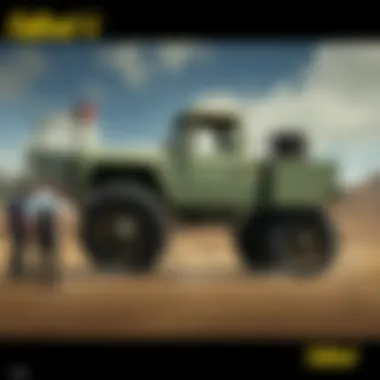Exploring Imposter Wheels in Fallout's Post-Apocalyptic Realm


Intro
The Fallout series, a cornerstone of post-apocalyptic gaming, presents its world as a fractured reflection of 1950s America, steeped in nostalgia but ravaged by nuclear fallout. Within this landscape, the imposter wheels concept emerges as a unique mechanic that engages players on multiple levels. This article embarks on an exploration of imposter wheels, dissecting how they amplify player interaction, narrative depth, and overall immersion within this iconic universe.
As we traverse through this discussion, we will scrutinize the lore, gameplay strategies, and character dynamics that showcase the importance of imposter wheels. Whether you're a veteran survivor navigating the Wasteland for decades or a greenhorn just setting foot in the irradiated cities, understanding this feature can enhance your experience significantly.
Foreword to Imposter Wheels
Imposter wheels serve as a cornerstone in understanding the intricate layers of gameplay within the Fallout series. They invite players not merely to engage with the mechanics but to journey through narratives and character arcs that reflect the chaos of a post-apocalyptic world. To grasp the importance of imposter wheels, one must first appreciate how they boost immersion and interaction, creating a more vivid and relatable environment for players. In a universe riddled with uncertainty and moral ambiguity, these wheels help in defining paths and implications that resonate throughout the gaming experience.
Defining Imposter Wheels
At its core, an imposter wheel is a minimalistic yet profound design mechanism that allows players to navigate decision-making processes while juggling multiple identities or roles. When you dive into a Fallout game, you find yourself not just as a single character but intertwined with various factions, each possessing its own agenda. The imposter wheel facilitates this transition, allowing choices that can lead to unique outcomes tailored to player decisions. Think of it as a bicycle wheel, but instead of spokes, you have choices radiating out to different storylines, essentially steering you toward different gameplay scenarios.
The significance of imposter wheels becomes clear when you consider how they mirror real-life dilemmas. Choices aren't merely binary; they ripple through the world, affecting relationships and narrative arcs in unexpected ways. For instance, choosing to align with the Brotherhood of Steel could lead you to acquire advanced technology but at the cost of alienating the Railroad faction. This dynamic not only boosts engagement but also enhances the storytelling elements inherent in Fallout.
Origins in Game Design
The roots of imposter wheels can be found in earlier game design philosophies. The idea of making choices that resonate throughout the gameplay isn't novel, but its application in Fallout characterizes a significant evolution in how gaming narratives unfold. Many game designers now look to imposter mechanics as tools to inject depth into experiences, striving to break away from linear pathways.
Historically, games like Dungeons and Dragons laid the groundwork for complex storytelling driven by player choice. Developers soon realized that playing into multiple personas could enchant players further. Fallout took this idea and crafted a model where you can essentially assume multiple identities, experiencing the fallout—pun intended—of your choices.
This blend of story and mechanic birthed new paradigms in gaming. Instead of providing a straightforward narrative, the use of imposter wheels encourages players to explore diverse scenarios and outcomes. In essence, they create a sandbox environment where players can test morals, alliances, and their own understanding of right and wrong, immersing them deeply in the post-apocalyptic chaos that defines the Fallout universe.
The Role of Imposter Mechanics
In the realm of gaming, the effectiveness of imposter mechanics, particularly within the Fallout universe, warrants a closer examination. These mechanics can make or break the immersive experience that players crave in a post-apocalyptic setting. They not only enhance the interaction between players and the game world but also serve as an innovative tool for developers, fostering deeper engagement with gameplay.
Understanding Game Mechanics
Game mechanics are the fundamental rules and systems that govern player interactions in a video game. In the case of Fallout, imposter wheels exemplify a unique gameplay element that enables players to engage with varying degrees of choice and consequence. They allow players to decide how to approach challenges, whether through combat, negotiation, or stealth.
- Choice Variety: With imposter wheels, a player can choose from numerous options, each leading to distinct outcomes. This choice aspect is not just about gameplay; it's deeply intertwined with narrative development.
- Dynamic Interaction: These mechanics facilitate a more organic relationship with the world; players can witness their decisions unfolding in real-time. It’s this flexibility that keeps players coming back for more.
- Emergent Storytelling: By leveraging these mechanics, the game promotes emergent storytelling. Players find themselves creating their own narratives, often influenced by how they utilize the imposter wheels.
Players not familiar with these dynamics might find the learning curve steep initially. However, with time, they uncover the layers of strategy and decision-making that these mechanics demand. This makes understanding game mechanics vital for both new and seasoned players.
Imposter Wheels and Player Experience
Player experience in Fallout hinges on the immediacy and impact of choices facilitated by imposter wheels. These choice-driven interactions do more than just add layers to gameplay; they significantly enhance emotional investments. When players make decisions that shape their journey, the connection to the game deepens.
- Immersion Boost: Each choice taken through the imposter wheel often resonates beyond the game, allowing the player to feel part of a living, breathing world. It transforms a simple action into a consequential moment, leading to a richer gameplay experience.
- Player Agency: Players want to feel in control of their destiny. The customization offered through these wheels gives them that power. It’s the difference between a scripted encounter and one where the player’s choice is the defining factor.
- Replayability Factor: Every time a player cycles through the imposter wheel, they encounter a plethora of paths. This not only enhances replayability but invites experimentation, allowing players to explore different facets of character development and story arcs.


As a result, imposter wheels define how players interact with the world and with each other. The ripple effects of these decisions can foster community discussions and theories about the implications of choices made during gameplay.
"Imposter mechanics turn simple interactions into complex narratives, making every decision feel weighty."
Imposter Wheels in Fallout Narratives
Imposter wheels are far from mere gameplay gimmicks; they serve as a linchpin within the complex web of narratives in the Fallout universe. Understanding their role offers players not just a competitive edge in strategy but also a deeper insight into the overarching themes and character arcs that define the franchise. These mechanics are intentional elements designed to enhance storytelling, developing a richer ambiance in the post-apocalyptic setting.
Storytelling Techniques
At the heart of Fallout's storytelling lies a delicate interplay between choice and consequence, which imposter wheels amplify. By providing players with multiple avenues to navigate through the narrative, these wheels facilitate the creation of a personalized story experience. Players are not shoved down a linear path; instead, they can experiment with different approaches that align with their character's persona, thus fostering a sense of ownership over their journey.
For instance, in Fallout: New Vegas, the use of imposter wheels can reveal different factions and how players respond to them. Choices made in dialogue are crucial; thus, the imposter wheel system enables nuanced interactions, shaping both plot and character relationships. Through this technique, players will often find themselves immersed in intricate plotlines that demand and reward strategic thinking.
"In Fallout, your choices are as meaningful as the ruins of the Wasteland—each decision echoes in the world long after it's made."
Character Development and Imposter Wheels
Imposter wheels also play a significant role in character development, allowing for a robust framework through which players can explore identities within the game. This mechanic invites players to shape their characters not just by combat abilities but also through social dexterity. The emotional stakes rise as these choices reflect the player’s ethical stance—be it a ruthless warlord, a selfless hero, or something in between.
Take the character of Caesar's Legion, for example. Depending on how players interact through the imposter wheel, they can either align with or oppose this faction. Characters evolve, not only in stats but in persona and worldview shaped by player interactions. The responsive nature of imposter wheels means that every dialogue choice is a brushstroke on the canvas of character identity. As players decide whether to charm, intimidate, or deceive, the implications ripple through their relationships with other characters, significantly altering the Fallout experience.
In the end, imposter wheels in Fallout serve as powerful tools for narrative depth and character exploration. They create not only mechanical engagement but also emotional resonance that keeps players rooted in the daunting yet intriguing world of the Wasteland. As fans of the Fallout series continue to uncover layers of this complex universe, the function of imposter wheels will undoubtedly remain pertinent to their understanding of both narrative and identity.
Gameplay Strategies Utilizing Imposter Wheels
In the expansive world of Fallout, where choices often dictate the course of one's journey, imposter wheels serve as a crucial element in enhancing player strategies. They allow players to navigate complex scenarios by employing techniques that not only enrich gameplay experience but also impact narrative outcomes. Understanding these strategies is key for both seasoned veterans and fresh wanderers walking through the barren landscapes.
Crafting Effective Tactics
When it comes to crafting effective tactics, players need to recognize the nuances of their environment. Imposter wheels offer a variety of options that can be tailored to different situations. For instance:
- Resource Management: In survival elements of Fallout, using imposter wheels to assess resources is vital. Players can create a strategy where they prioritize gathering essential items like food and ammo while being stealthy. Quick decision-making through the wheel can mean life or death.
- Character Skill Utilization: The game allows characters to develop various skills. Through imposter wheels, players can enhance certain traits that suit their gameplay style. For example, focusing on stealth or charisma might open new doors or provide strategic advantages in combat or dialogue.
- Dynamic Decision-Making: The beauty of imposter wheels lies in their flexibility. As players encounter unpredictable scenarios, having multiple options readily available allows them to pivot tactics quickly, whether it's facing a raider ambush or negotiating with a faction.
Using these tactics can significantly shift the tide of encounters leading to a richer gaming experience. It’s not just about survival; it’s about the art of strategy.
Case Studies from Popular Gameplay
To better illustrate how effective these tactics can be, let’s dive into some notable case studies from the gameplay community. Each example reveals diverse applications of imposter wheels and exemplifies their impact:
- The Lone Wanderer's Approach: A player documented their journey using an imposter wheel focused on diplomacy rather than brute force. Throughout their playthrough, they jawed their way out of conflicts by selecting dialogue options that favored understanding and cooperation, ultimately resulting in allies instead of enemies. This tactical use of mechanics not only preserved resources but enhanced the storyline.
- Power Armor Savvy: Another player shared an experience involving a meticulously crafted build around power armor. Equipped with high-level technology and skills, they utilized the imposter wheel to switch load-outs on the fly. When faced with overwhelming odds, they could quickly shift between offense and defense tactics, showcasing how imposter wheels bolster adaptability in dynamic combat.
- Faction Diplomacy: Engaging with different factions often leads to rich story branches within Fallout. A continuous pattern seen in forums like Reddit shows players leveraging imposter wheels to navigate complex faction relationships. By choosing specific dialogue paths, they were able to form alliances that drastically altered their gameplay environment, allowing for resource sharing and strategic advantages against common foes.
Through such strategies, players deftly navigate the post-apocalyptic world, crafting their narratives while utilizing the various benefits imparted by the imposter wheels. In this way, the mechanism not only enhances gameplay but also makes the vast universe of Fallout feel connected and responsive to player decisions.


"In Fallout, every choice echo your presence in the wasteland; understanding imposter wheels strengthen that echo."
Thinking critically about imposter wheels transforms these gameplay elements into tools that go beyond mechanics, morphing interactions into a rich tapestry of player experience.
Community Perspectives on Imposter Wheels
Understanding community perspectives on imposter wheels is crucial for a full appreciation of their role in Fallout's universe. Fans engage with the games not just as players but as interpreters of lore, mechanics, and societal commentary woven into the post-apocalyptic narrative. This collective exploration fosters a vibrant discourse that enriches the gaming experience.
Fan Theories and Interpretations
Fans of Fallout often come together to share their interpretations of imposter wheels, and these discussions can sparkle with creativity and insight. At its core, many believe imposter wheels symbolize the blurred lines between identity and survival in a harsh world. Players argue that these mechanics reflect the struggles of their characters, who must navigate various facades to endure a ruthless environment. For instance, a player might perceive the imposter wheel as a commentary on how people adapt in the wasteland, portraying their skills as shifting as the sands of the desert itself.
When fans theorize about the implications of the wheels, they often pinpoint specific character arcs. For example, in Fallout 4, the protagonist is seen to adopt different personalities, depending on their interactions and choices, which can be likened to the way imposter wheels function. This emphasizes the fluidity of identity and how the struggle to remain authentic undermines the often brutal reality of survival.
Players also delve into alternate interpretations where these mechanics serve as a mirror reflecting societal behaviors in the real world, showcasing how individuals often hide true selves behind crafted façades in social interactions.
In summation, fan theories can elevate the conversation around imposter wheels, encouraging others to examine the deeper significance behind what might seem like a mere gameplay mechanic. Each interpretation not only extends beyond the confines of the game but also promotes broader discussions among enthusiasts. To stay engaged, players often reference platforms like Reddit, where theories are discussed across various threads, or groups on Facebook dedicated to Fallout lore.
Shared Experiences and Strategies
The community has built a rich tapestry of shared experiences and strategies revolving around imposter wheels. Players constantly exchange tips on how to best utilize these mechanics to enrich their gameplay. One popular strategy is to leverage the imposter wheel for stealth missions, where the right choices can lead to completing objectives without a shot being fired. Utilizing opportunities allows players to feel more immersed, channeling their inner survivor while making strategic decisions that feed into their character's narrative.
Furthermore, engaging in strategies can create a camaraderie among players. They share stories of victories and failures, where the imposter wheels either saved them from a sticky situation or led them to ruin due to poor choices. This synergy within the community can inspire innovative gameplay that tweaks the traditional approach. One player might share how a specific path with the imposter wheel enabled them to charm a hostile faction, thus allowing them to avoid combat altogether.
Equally, players often reflect upon moments of existential crisis within the game and how the imposter wheel can alter the emotional landscape of a player’s journey. When discussing survival tactics, players have even suggested that the imposter mechanic should be embraced as a tool for collaboration; an approach that has proven beneficial in various cooperative game modes where team dynamics play a significant role.
Ultimately, the shared strategies around imposter wheels reveal how players adapt their own experiences to enhance not only personal gameplay but also the gaming community as a whole. Engaging with others helps foster a deeper connection to the game, bridging gaps that players might feel while traversing through the post-apocalyptic chaos. This collective sharing becomes a resource in itself, underscoring the rich dialogues that can emerge within the community.
Limitations and Challenges of Imposter Wheels
Exploring the limitations and challenges of imposter wheels gives us a clear view into the balancing act developers face in crafting engaging gameplay within the Fallout universe. As exciting as these mechanics are, they bring with them certain considerations that can either enhance or detract from a player’s overall experience. The nuanced interplay between imposter wheels and game balance, as well as the technical hurdles they create, are crucial to understanding why they sometimes miss the mark.
Impact on Game Balance
Imposter wheels are designed to enrich player interaction and decision-making. However, when poorly implemented, they can lead to significant issues in game balance. For example, consider how an overpowered imposter wheel might make gameplay lopsided. Players could easily exploit these mechanics, leading to a gameplay experience that feels less challenging and more like a walk in the park. This flattens the intensity and excitement that a game like Fallout is known for.
- Power Dynamics: If certain imposter wheels allow players to bypass difficult gameplay sections, it reduces the sense of accomplishment that comes from overcoming tough challenges.
- Player Diversity: Too much reliance on imposter wheels can homogenize character development. If every player utilizes the same strategies tied to these wheels, the individuality of characters suffers, making interactions bland.
- Game Environment: Fallout thrives on its immersive landscapes. If imposter wheels allow players to easily sidestep environmental dangers or challenges, it can disrupt the careful design of these spaces.
In essence, the very tools meant to engage players can sometimes tip the scales too far, making successful game balance a challenging task for developers.
Technical Constraints


Technical limitations present another layer of challenges associated with imposter wheels. These wheels may introduce complexities that strain the game’s infrastructure.
- Performance Issues: The various visual effects and animations associated with imposter wheels might lead to decreased performance, especially in resource-intensive scenarios. Fallout's expansive worlds demand significant processing power, and introducing more complex mechanics only adds to the load.
- Compatibility Concerns: As games evolve, so too do the mechanics that underpin them. This can create a situation where older systems struggle to accommodate new imposter wheels, leading to gameplay issues or crashes that frustrate players.
- Development Time: Integrating imposter wheels requires careful planning and extensive testing. Given the intricate storylines and vast environments of Fallout, rushing this process can result in buggy implementations that detract from the overall player experience.
"Game design is a dance of balance, where one misstep can disrupt the entire performance."
For more insights and community discussions on the challenges of imposter wheels, check out reddit.com/r/Fallout and explore player experiences and strategies.
The Future of Imposter Wheels in Gaming
As the gaming landscape constantly shifts, identifying the trajectory of mechanics like imposter wheels becomes paramount. Gamers, especially those immersed in expansive worlds like Fallout, tend to form strong connections with how gameplay mechanics impact their experience. The evolution of imposter wheels can significantly shape player engagement and overall satisfaction.
Anticipated Developments in Fallout
In the realm of Fallout, the imminent development of imposter wheels is sure to usher in an exciting new chapter. Players have become increasingly attuned to the intricacies of gameplay elements, calling for mechanics that offer deeper engagement. As the franchises move forward, enhanced fail-safes and greater player choices merit attention. Some possible advancements include:
- Dynamic Choices: Fallout could introduce an even more fluid wheel where actions dynamically adjust based on player history and decision-making. Such a structure might allow a more personalized gameplay experience, where every player’s choices resonate uniquely, shaping their journey in the post-apocalyptic world.
- Visual and Thematic Upgrades: This genre is known for its visual storytelling. Expect to see imposter wheels not merely as functional components but as narrative devices that reflect in-game developments or character arcs. Imagine a wheel that displays art or symbols representing previous quests and decisions.
- Integration of AI: Incorporating AI could lend a fresh perspective to imposter wheels. Real-time adjustments based on player behavior or preferences could cater to individual gaming styles. If a player often gravitates toward diplomacy, the wheel might highlight conversation tools over combat options.
"Continually evolving mechanics is essential to keep the player base engaged and amplify mystery in the narrative."
Broader Trends in Game Design
Beyond just the Fallout series, the concept of imposter wheels intertwines with broader trends in game design. Several key considerations warrant attention:
- User-Centric Design: Today, players desire more agency in their gaming experience. This budding demand for user-centric designs highlights the need for mechanics like imposter wheels to be adaptable and responsive, offering choices that align with the player’s approach.
- Interactive Storytelling: There is a growing focus on establishing deep connections between players and narratives. Developers are crafting games where player choices directly affect outcomes. Following this trend, imposter wheels may evolve to encapsulate varying narrative pathways based on player decisions, ensuring that every playthrough remains unique.
- Community-Driven Evolution: As seen with platforms like Reddit, community insights play a huge role in game development. The evolution of imposter wheels could reflect player discussions and preferences. Using feedback effectively might lead to features that precisely cater to the gaming community’s desires.
End
The future of imposter wheels in gaming holds promise for deeper engagement and more personalized experiences. Whether through advanced AI or deeper narrative integration, the evolution is bound to captivate players and enrich their journeys in the worlds they love. As such developments unfold, they will not only reshape player interactions but potentially redefine what it means to engage with post-apocalyptic narratives.
Finale
In any discussion surrounding imposter wheels in the Fallout universe, understanding the implications of these mechanics carries significant weight. This is primarily because they’re not just gameplay elements; they embody a complex interplay between strategy, narrative, and player agency. The imposter wheels serve as a framework that connects diverse gameplay experiences, enriching them with layers of decision-making and emotional engagement. Not only do they challenge players to think critically about their choices, but they also enhance the immersive quality of the post-apocalyptic world by blending the line between survival tactics and storytelling.
Recap of Key Insights
Drawing from our exploration, several key insights emerge:
- Strategic Depth: Imposter wheels allow players to craft specific strategies based on their understanding of in-game dynamics. They invite tactical thinking and variation in gameplay that is not simply linear.
- Narrative Integration: Through the lens of storytelling, imposter wheels deepen character development and plot engagement, encouraging players to invest emotionally in their choices. The weight of decisions amplifies the narrative stakes, making story arcs more compelling.
- Community Impact: The communal interpretations and shared experiences surrounding imposter wheels foster discussions that enrich the overall gaming experience. It highlights the sense of camaraderie among players who navigate through Fallout’s rich universe together.
Final Thoughts on Imposter Wheels
The future of imposter wheels in gaming, particularly within the Fallout series, is a canvas awaiting more strokes of creativity. As developers continue to innovate, we can anticipate even more nuanced implementations of these mechanics. The blend of gameplay strategy, narrative depth, and community engagement ensures that imposter wheels remain a vital topic of discourse.
Challenges may arise, affecting balance and technical execution, but the benefits are undeniable. Players will likely continue to embrace the intricacies of this game design choice, allowing imposter wheels to play a crucial role in shaping their emotional and tactical experiences. After all, in a world as unforgiving as Fallout's, every choice matters, and every wheel turned can lead to profound consequences.
"In the wasteland, every decision paints the world anew; imposter wheels are the brushes we wield."
By reflecting on these insights, we remind ourselves that gaming is not just about entertainment; it’s a complex, shared journey of exploration. For those who delve into this multifaceted landscape, imposter wheels will continue to serve as a captivating component that enhances the overall experience.







